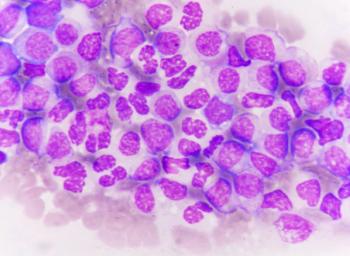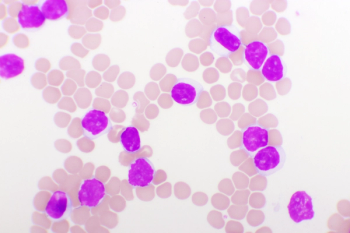
Magrolimab in combination with azacitidine and venetoclax was well tolerated and yielded promising responses among patients with high-risk acute myeloid leukemia regardless of TP53 mutation status.

Your AI-Trained Oncology Knowledge Connection!


Magrolimab in combination with azacitidine and venetoclax was well tolerated and yielded promising responses among patients with high-risk acute myeloid leukemia regardless of TP53 mutation status.

Everolimus failed to improve survival outcomes when added to adjuvant endocrine therapy in patients with HR+/HER2- breast cancer, according to findings from the phase 3 SWOG S1207 trial.

Findings from the phase 2 BIONIKK trial demonstrated an association between treatment efficacy and increased in situ and immune expression.

Results from the phase 3 IPSOS trial showed a nearly doubled rate of 2-year overall survival with atezolizumab in patients with advanced non–small cell lung cancer.

Pembrolizumab plus chemoradiation did not meet statistically significant improvement in event-free survival for patients with locally advanced head and neck squamous cell carcinoma.

A phase 3 study presented at 2022 ESMO showed progression-free survival benefit of nirogacestat over placebo for patients with progressive desmoid tumors.

Results from a phase 1b trial showed efficacy potential of sotorasib plus SHP2 inhibitor RMC-4630 for patients with pretreated or KRAS G12C inhibitor–naïve non–small cell lung cancer.

According to data from the phase 1 CHRYSALIS-2 trial that were presented at 2022 WCLC, a combination containing amivantamab, lazertinib, and chemotherapy was effective in patients with pretreated non–small cell lung cancer harboring EGFR mutations.

In the phase 2 Alliance A059102 trial, patients with treatment-naïve CD30-negative peripheral T-cell lymphoma will be treated with duvelisib and azacitidine plus CHOP/CHOEP chemotherapy.

A phase 1 trial evaluating SOT101 plus or minus pembrolizumab indicates the safety and potential efficacy of the agent for the treatment of advanced solid tumors.

Bevacizumab plus FOLFOXIRI was superior to bevacizumab plus FOLFOX or FOLFIRI in terms of efficacy but was more toxic in certain patients with initially unresectable colorectal cancer liver metastases.

Transplant following lenalidomide, bortezomib, and dexamethasone with lenalidomide maintenance was superior to the treatment course without transplant, according to data at 2022 ASCO.

Prior findings showing the benefit of brentuximab vedotin plus chemotherapy vs chemotherapy alone for the treatment of patients with previously untreated stage III/IV classical Hodgkin lymphoma was supported by 6-year updated overall survival data.

Findings from a phase 2 clinical trial identified a differentially expressed gene profile in those diagnosed with nonsclerotic and superficially sclerotic chronic graft-vs-host-disease who responded to topical ruxolitinib.

Patients with advanced melanoma receiving nivolumab plus ipilimumab in the second-line setting had significant improvement in progression-free survival.

Antitumor activity was noted for patients with recurrent or metastatic head and neck cancer who were treated with pepinemab plus pembrolizumab.

Results of the phase 1 NRG-GY017 trial show promise of atezolizumab as an immune primer in locally advanced cervical cancer.

Patients with metastatic renal cell carcinoma and a performance status of 2 or more experienced promising clinical activity from treatment with nivolumab/ipilimumab and pembrolizumab/axitinib.

Despite missing the trial primary end point of overall survival improvement at 1 year, data for avelumab in cisplatin-ineligible, PD-L1–positive advanced urothelial cancer demonstrated superior responses and disease control rates.

Data presented at 2022 ASCO GU of niraparib-based therapy for patients with metastatic castration-resistant prostate cancer showed a boost in radiographic progression-free survival vs matched placebo.

Patients with unresectable hepatocellular carcinoma received an overall survival benefit following first-line treatment with durvalumab (Imfinzi) and tremelimumab.

CD123- and CD3-engaging bispecific antibody, APVO436, caused cytokine release syndrome that could be managed through the use of steroids in patients with relapsed/refractory acute myeloid leukemia and myelodysplastic syndrome.

Patients with previously untreated diffuse large B-cell lymphoma experienced promising responses after being treated with tafasitamab-cxix and lenalidomide plus rituximab, cyclophosphamide, doxorubicin, vincristin, and prednisone.

A 27% reduction in the risk of progression or death was noted when polatuzumab vedotin was added on R-CHP vs R-CHOP for patients with intermediate- or high-risk diffuse large B-cell lymphoma who received treatment in the first line.

Improvement in major molecular response rate and depth of response coupled with a favorable safety profile were noted with asciminib vs bosutinib in patients with chronic-phase chronic myeloid leukemia.

Ibrutinib and ventoclex given in the frontline setting demonstrated deeper and longer minimal residual disease for elderly and unfit patients with chronic lymphocytic leukemia.

Second-line fam-trastuzumab deruxtecan-nxki prolonged survival and led to higher responses over ado-trastuzumab emtansine for patients with HER2-positive metastatic breast cancer.

A pooled analysis found that genomic alterations identified through multigene sequencing led to progression-free survival improvements over maintenance chemotherapy for HER2-negative metastatic breast cancer.

As more novel therapeutic targets are discovered in patients with chronic lymphocytic leukemia, the more possibilities are presented in terms of treatment with targeted agents, small molecules, and cellular therapies.

An association was seen between baseline HER2 expression levels and the antitumor activity of fam-trastuzumab deruxtecan-nxki for patients with HER2-positive, metastatic colorectal cancer.